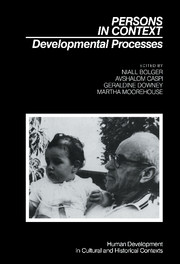Book contents
- Frontmatter
- Contents
- Preface
- Contributors
- 1 Development in context: research perspectives
- 2 Interacting systems in human development Research
- 3 Children, families, and communities: ways of viewing their relationships to each other
- 4 Human development and social change: an emerging perspective on the life course
- 5 Family process: loops, levels, and linkages
- 6 On the constructive role of problem behavior in adolescence
- 7 The sociogenesis of self concepts
- 8 Putting persons back into the context
- 9 How genotypes and environments combine: development and individual differences
- Author index
- Subject index
1 - Development in context: research perspectives
Published online by Cambridge University Press: 04 May 2010
- Frontmatter
- Contents
- Preface
- Contributors
- 1 Development in context: research perspectives
- 2 Interacting systems in human development Research
- 3 Children, families, and communities: ways of viewing their relationships to each other
- 4 Human development and social change: an emerging perspective on the life course
- 5 Family process: loops, levels, and linkages
- 6 On the constructive role of problem behavior in adolescence
- 7 The sociogenesis of self concepts
- 8 Putting persons back into the context
- 9 How genotypes and environments combine: development and individual differences
- Author index
- Subject index
Summary
Development in context
Individuals develop in an ever-changing environment, and students of human development must do more than simply acknowledge the interaction between the two. The contributors to this volume assume the task of translating this homily into an integrative perspective on how individuals and environments are linked in the course of development.
In this introductory chapter, we outline the orienting principles that inform the study of development in context and that also unify the contributions to this volume. We begin with a representation of the environment in which development takes place and then examine the role of individuals as producers of their development.
Representations of the environment
The environment in which individuals develop consists of a complex system of physical, social, cultural, and historical factors that interact with each other and with the developing individual. Most psychologists agree that these factors are influential in regulating development, yet they persist in viewing the environment as an undifferentiated set of factors. The difficulty with this position can be appreciated best by considering where developmental theory would be if we failed to distinguish between cognitive, affective, and behavioral sources of individual change.
Would a theory of development that details the structure and process of environmental sources of change add to our understanding of development? Several theorists have suggested as much. The most consistent advocate of a theory of development in context is Bronfenbrenner (1979, this volume).
- Type
- Chapter
- Information
- Persons in ContextDevelopmental Processes, pp. 1 - 24Publisher: Cambridge University PressPrint publication year: 1989



